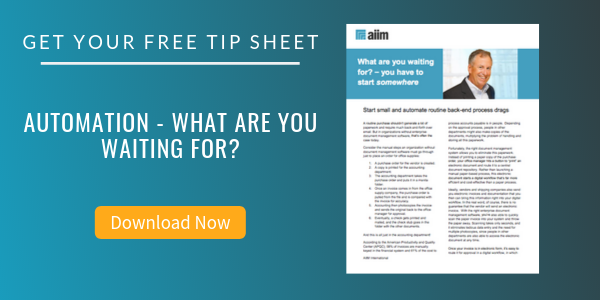
Analytics and Digital Transformation Are the REAL Reason to Automate Financial Processes – Part 3 of 3
Automation | Accounting and Finance
According to the American Productivity and Quality Center, an amazing 74% of organizations are currently engaged in a finance process improvement initiative. Why are they doing this? And how does this tie to broader Digital Transformation initiatives?
The APQC survey notes that 50% of these initiatives are being driven by “the realization of the need for better business analytics.” This business driver is even higher -- and far more strategic -- than the traditional driver for financial process automation, cost reduction.
Ding, ding, ding, we have a winner in the Digital Transformation sweepstakes.
Demands are rising for finance executives to play a more fundamental role in the transformation of the business and to provide the analytics and data needed to document and drive that change. Per Mary Driscoll in the APQC blog,
“Business managers are changing their tune when it comes to what they want from finance. They now insist that finance re-imagine itself and deliver a step-change in the quality and relevance of insights it generates. What used to be called decision support is now branded—with large doses of aspiration—as predictive business analytics. Finance is expected to keep pace with the enterprise’s data-driven race toward competitive advantage. That means mastering the analytical methods, tools, and terminology of the day.”
Gabriel Zubizarreta from Silicon Valley Accountants noted some of the structural impediments to fundamental financial process transformation in an interview on the APQC blog:
“There are significant structural disincentives to change. The deadline-driven nature of the accounting close makes implementing changes risky. If a change goes well, typically, the rewards are small, but if a change goes badly and impedes or delays the close, the consequences for the accountant championing the change can be severe. When you consider that up to 70 percent of process improvement projects fall short of expectations and/or go significantly over budget, it makes total sense for accounting departments to be risk-averse.
In the past, many process improvement initiatives have focused on the “big bang” such as the implementation of a new ERP system or other significant automation. Even if this kind of big bang improvement is successful at first, underlying conditions will change, requiring that processes will need to continue changing, or they will become outdated.
And there is one more thing to consider. Since the implementation of Sarbanes-Oxley, companies have added layers of controls. Often, these controls are implemented in a way that becomes inflexible and resistant to change. We understand that compliance is crucial, but it can’t be the sole focus. Companies need to implement compliance and agility controls and continuous, improvement. Finding the balance is not easy, but it is crucial if companies are to thrive as conditions change.”
Information Capture is a proven first step in digitizing information and improving financial processes. According to AIIM’s Paperfree Progress: Measuring Outcomes, 72% agree – “Business at the speed of paper will be unacceptable in a few years’ time.” But mere “Digitization” (getting stuff digital) is not enough, even though the ROI of this simple step is impressive (59% of users achieved payback in 12 months or less (a single budget cycle), including 28% seeing positive returns after just 6 months).
In addition to “Digitization,” organizations need to pursue “Digitalization” -- getting the business to execute and adapt with the benefit of information in digital form, using the availability of information as an engine for customer experience, business transformation, and adaptation. Leveraging the capture and mailroom technologies and capabilities you already have, and applying this experience to get the fat out of financial processes is a great place to start. Capture doesn’t just occur in the mailroom anymore: It includes distributed capture, real-time/mobile capture, and capture as a service, all critical to the task of automating financial processes.
No C-level executive ever woke up in the morning, slapped themselves on the head, and said, “Wow. The sexy Digital Transformation thing I want to do today is transform my financial processes.” But they need to get serious about these processes. Yes, automating them can cut costs -- savings that can be used to fuel other initiatives.
But more importantly, automating financial processes sets in motion two critical Digital Transformation value propositions -- 1) back-end processes are often the difference between customer experiences that feel good initially, but then wind up being frustrated and disjointed, and 2) financial processes are a key source of the analytics and business intelligence needed to transform customer experiences.
About John Mancini
John Mancini is the President of Content Results, LLC and the Past President of AIIM. He is a well-known author, speaker, and advisor on information management, digital transformation and intelligent automation. John is a frequent keynote speaker and author of more than 30 eBooks on a variety of topics. He can be found on Twitter, LinkedIn and Facebook as jmancini77. Recent keynote topics include: The Stairway to Digital Transformation Navigating Disruptive Waters — 4 Things You Need to Know to Build Your Digital Transformation Strategy Getting Ahead of the Digital Transformation Curve Viewing Information Management Through a New Lens Digital Disruption: 6 Strategies to Avoid Being “Blockbustered” Specialties: Keynote speaker and writer on AI, RPA, intelligent Information Management, Intelligent Automation and Digital Transformation. Consensus-building with Boards to create strategic focus, action, and accountability. Extensive public speaking and public relations work Conversant and experienced in major technology issues and trends. Expert on inbound and content marketing, particularly in an association environment and on the Hubspot platform. John is a Phi Beta Kappa graduate of the College of William and Mary, and holds an M.A. in Public Policy from the Woodrow Wilson School at Princeton University.



